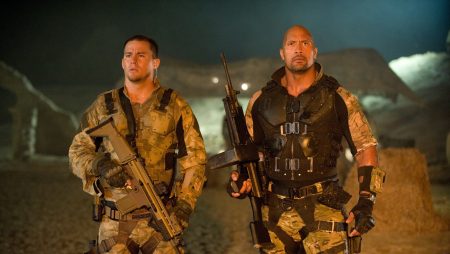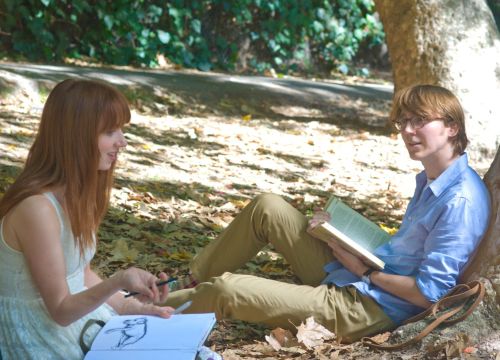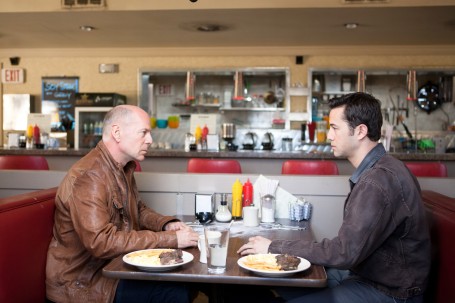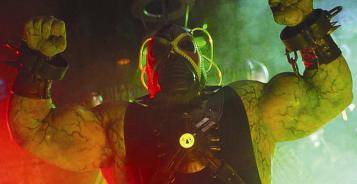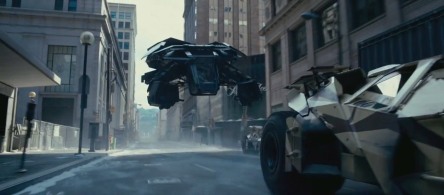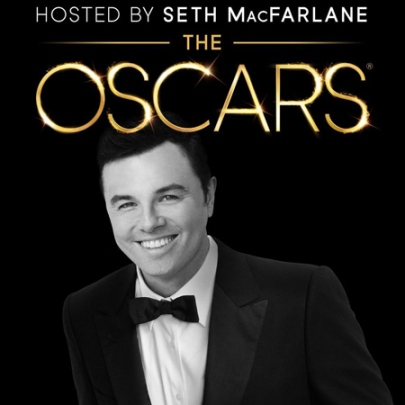
The Oscars Liveblog hosted by David Neary
Last year life got a little in the way of some good old-fashioned live-blogging, so this year there’s simply no excuse. It’s gonna be a long night… good thing I stocked up on supplies. For those of you joining me from East of USA, start the coffee now (and have a reserve Red Bull tucked away at the back of the fridge). For those of you in the US and Canada, welcome, be grateful for your timezone and be understanding of the several typos that follow – things won’t kick off ’til after 1am and I won’t be watching what the keyboard.
If you missed my predictions, check them out here, but in short Argo for Best Picture, Spielberg for Best Director and a cleanish sweep of the technicals for Life of Pi.
Be sure to check back here as events on the red carpet, and later and more importantly the Awards themselves, kick off. As always I will be simultaneously live-tweeting on @DeusExCinema.
See you back here in a little bit…
[all times are in Pacific Time. Add eight hours to comprehend how tired I am]
3:20pm – OK, here we go.
3:22pm – Jessica Chastain looks sensational. If her dress was a little more gold she’d be an award statuette herself.
3.27pm – Amy Adams does not like Ryan Seacrest much. Also, her dress looks it would be good for dusting.
3.28pm – Samantha Barks’s dress! Give it the Oscars! All the Oscars!
3.30pm – Reese Witherspoon looks better than many of the nominees. Good dress, great hair. Now all she needs is a good movie.
3.32pm – Channing Tatum. So hot right now. Never gonna win an Oscar though.
3.34pm – Quvenzhané Wallis’s little princess outfit is perfect. She looks like Tiana in The Princess and the Frog. Ryan Seacrest is the frog.
3.37pm – Taking Octavia Spencer after her recent cameo in 30 Rock is not very easy.
3.43pm – Kerry Washington has just been talking to Ryan Seacrest longer than she was in Django Unchained.
3.46pm – In my head I imagine Jacki Weaver is married to Cloud Atlas star Hugo Weaver.
3.49pm – Kelly Osbourne’s hair is a colour I describe as dead pink.
3.51pm – Love Amanda Seyfried’s dress. She looks superb, but did she drive to the Oscars with the top down?
3.52pm – THAT’S what every Oscars has been missing up to now – Bryan Cranston!
3.54pm – Jennifer Lawrence; looking perfect, if a little minimalist. Dress isn’t exactly… accentuating anything…
3.59pm – Not liking Sally Field’s dress. Also, why is Joseph Gordon-Levitt talking in that deeper-than-usual voice?
4.03pm – Jennifer Hudson looks better and better every year. Does she still do movies though?
4.05pm – Is it just me, or is the red carpet actually kind of mauve?
4.07pm – Anyone else want Channing Tatum’s baby to be born during the show?
4.12pm – Catherine Zeta-Jones looking like a Valkyrie. Michael Douglas looking healthy. Things we like to see.
4.14pm – Helen Hunt looks like she just showed up for the 1998 Oscars. Still as good as it gets, apparently.
4.17pm – I can’t make fun of Christoph Waltz’s hispter glasses because my new glasses are sadly very similar.
4.18pm – Argo or Lincoln… who cares? Anne Hathaway’s dress is clearly going to be the most divisive issue of the night.
4.20pm – Naomi Watts came to the Oscars wearing Nicole Kidman’s skin.
4.22pm – Charlize Theron is still the best-looking woman in Hollywood. Unless, as her last film suggests, you count Kirsten Stewart.
4.27pm – Bradley Cooper’s hair is more handsome than my face.
4.45pm – Adele looks totally ready for the 1965 Oscars.
4.47pm – Nicole Kidman is dressed like an evil female Oscar. I kind of love it.
4.51pm – I wish Hugh Jackman wasn’t so charming, I’ll feel bad now when he loses to Day-Lewis.
5.01pm – Somehow Jennifer Aniston’s red dress clashes with the red carpet. Someone did their job wrong.
5.03pm – And Jennifer Garner’s (stunning) mauve dress matches the red carpet! What is going on?!?
5.05pm – Halle Berry: “I’ve never been more proud to be part of a franchise as that one (Bond).” Sucks to be the X-Men franchise right now.
5.15pm – Jamie Foxx’s grey tux has more personality than Jamie Foxx.
5.19pm – No, seriously, is it the Oscars yet?
5.24pm – Renée Zellweger is ready for the Space Oscars!
5.30pm – Here we go! Seth MacFarlane, you are very welcome.
5.31pm – Making Tommy Lee Jones laugh on the first beat. Terrific comedy.
5.32pm – And a direct swipe at the Oscars for snubbing Ben Affleck. Wow, amazing start.
5.34pm – “If you bumped into Don Cheadle on the studio set, did you try and free him?” Seth to DDL on his method.
5.36pm – William Shatner cameo! This is pure Family Guy.
5.38pm – A jaunty musical number about boobs. Shame it’s pre-recorded.
5.40pm – Channing Tatum dancing with Charlize Theron. The world cannot handle this much sex appeal.
5.42pm – Flight done with sock-puppets. I now never need to see that film.
5.43pm – And now MacFarlane is singing with Joseph Gordon-Levitt and Daniel Radcliffe this is properly entertaining stuff.
5.45pm – Gidget jokes! I get these now!
5.47pm – And a parody of Be Our Guest. This is far more Beauty than Beast.
5.49pm – Octavia Spencer presenting Best Supporting Actor. All of the nominees have an Oscar already. Huh. Hoping for Jones, but we’ll see.
5.50pm – Christoph Waltz wins! For basically an identical role to the won he already won for! Hooray!
5.52pm – Waltz quotes Tarantino at Tarantino. Surely Tarantino quotes Tarantino at himself often enough.
5.57pm – Paul Rudd and Melissa McCarthy here to be loud and silly. I have no problem with this as long as it’s short.
5.58pm – Yes, that went on too long. Now, Best Animated Short.
5.59pm – Paperman wins. Very deserving. Gorgeous film. Plus I called it. So yeah. I win!
6.00pm – Best Animated Feature goes to Brave. Controversial stuff. Gutted for The Pirates! and Wreck-It Ralph.
6.02pm – Reese Witherspoon is here to look amazing. Also to talk about Life of Les Beasts of the Misérable Pi.
6.04pm – Quevenzhané Wallis looks delighted to be mentioned by the voice of Stewie Griffin.
6.06pm – The cast of The Avengers are here to make sure that people care about cinematography. This is good for everyone.
6.07pm – Claudio Miranda wins for Life of Pi. Superbly deserving.
6.09pm – Claudio Miranda should also win for Best Hair.
6.10pm – Best Visual Effects goes to…
6.11pm – Life of Pi! I called a clean sweep of technicals. Think I may have been right…
6.13pm – Oh wow, that may have been the most embarrassing musical ushering off stage I have ever seen.
6.17pm – Channing Tatum and Jennifer Aniston make an odd couple. Here they are to prepare us for the “less interesting” styley awards.
6.18pm – Anna Karenina gets the costume nod. Hugely deservingly. I think I called that. Did I call that?
6.20pm – And now Best Makeup goes to Les Misérables. Didn’t see that one coming at all.
6.21pm – Halle Berry is here to launch the Bond love-in. Even though she may be the worst Bond girl ever. I think we’ll all die another day.
6.24pm – Well now I just want to watch Bond films…
6.26pm – Shirley Bassey. Goodness!
6.28pm – Auric Goldfinger would be pissed to realise Oscars are only covered in a very thin layer of gold.
6.32pm – *snooze* Jamie Foxx and Kerry Washington out on stage to some very dull applause.
6.34pm – Best Short Film goes to Curfew. I did not see it, so have no comment to make. I’ll be over here when you need me.
6.36pm – Oh, Washington and Foxx are still there. Best Documentary Short goes to Inocente.
6.38pm – Liam Neeson is here to be badass.
6.39pm – Oooh, here come some clips from Argo Dark Lincoln.
6.42pm – “150 years and it’s still too soon.” MacFarlane got gasps there with a Lincoln assassination joke.
6.43pm – Ben Affleck is here to talk about documentaries. And to talk a swipe at Seth. Ouch.
6.44pm – Searching For Sugarman takes Best Documentary! I didn’t see it, but I sure as hell called it!
6.46pm – MacFarlane makes a quick stab at Prometheus. I’ll allow it.
6.50pm – Jennifer Garner and Jessica Chastain come on stage to the Cinema Paradiso theme. Now I’m just thinking of kissing in the rain…
6.51pm – If Amour doesn’t take Best Foreign Language Film this’ll be a big upset… and it does!
6.52pm – Michael Haneke seems a surprisingly chirpy fellow.
6.54pm – John Travolta looking suspiciously young is here present a celebration of recent movie musicals. Some of them are going to be awful.
6.56pm – I really dislike Chicago. The movie. The music. This is not pleasant.
6.57pm – That said, I probably hated Dreamgirls even more. Just get to Les Mis already!
6.59pm – But yeah, Jennifer Hudson can seriously damn well sing!
7.01pm – Excellent, sounds like the Les Mis crowd are doing ‘One Day More’. Epic tune.
7.02pm – This is a superb medley. And everyone looks fantastic.
7.05pm – OK, so the set-up is stolen from the 25th Anniversary Les Mis concert. But they’ve kind of killed it. Better than in the movie!
7.07pm – The upcoming films advertised in the ad breaks look almost universally terrible.
7.09pm – Here’s Chris Pine, our second Captain Kirk of the night, to regale us with a “previously on the Oscars” about the tech awards with Zoe Saldana.
7.12pm – Oh, OK, Ted and Mark Wahlberg are here. What are the audience seeing right now?
7.13pm – Best Sound Mixing goes Les Misérables. Deserved I guess.
7.15pm – Slightly dodgy Jewish jokes from Ted there. Sure they went down a treat with the audience.
7.16pm – Best Sound Editing is a tie! This very rarely happens. Zero Dark Thirty takes the first…
7.17pm – Skyfall takes the second! A huge surprise, but a great win!
7.19pm – Christopher Plummer welcomed onstage with a MacFarlane-esque movie reference. Clever stuff.
7.20pm – This is a rather lovely intro from Plummer to the Best Supporting Actress nominees.
7.22pm – If Anne Hathaway doesn’t win the world may vomit. Just a universal vomit.
7.23pm – Thank god. I wanted to keep down all this beer and popcorn.
7.24pm – It’s not an Oscars ’til there’s a hint of tears. Nice job Anne Hathaway!
7.30pm – Brief discussion about the upcoming Academy Museum. I like to work in film museums. Can I work there please?
7.32pm – Sandra Bullock is here to give out the editing award. One of the most important of all – let it never be forgotten. I called Argo.
7.34pm – And how right I was! Argo takes Best Editing. William Goldenberg did a terrific job, especially in the opening scenes.
7.35pm – Jennifer Lawrence and her Metroid dress introduce Adele to sing ‘Skyfall’. Wonder if it’ll win Best Song later…
7.38pm – Great performance of a great song. Worried Shirley Bassey is gonna kick Adele’s ass backstage after for stealing her thunder.
7.44pm – Nicole Kidman is here to tell us a little about Silver Django’s Amour.
7.48pm – Daniel Radcliffe and an amusingly hobbling Kristen Stewart, who keeps grunting in pain, announcing nominees for Production Design.
7.49pm – Lincoln takes it! I think I actually called that one! Hooray for Lincoln! Hooray for me!
7.52pm – Salma Hayek, looking like an exotic princess from a Pink Panther movie, tells us about some people who won some nice awards for niceness.
7.57pm – George Clooney, proving with his grey beard that time rolls forever onward, reminds us of those we’ve lost. Tears time!
8.01pm – A lot of sad losses this year, from Borgnine to Tony Scott. But the big surprise is Barbra Streisand coming out to sing ‘The Way We Were’. Fitting.
8.09pm – Chicago being honoured for no great reason. Oh wait, it’s to announce the Best Score award. That… sort of makes sense.
8.11pm – Another envelope struggle and… Life of Pi wins it! That puts it well in the lead tonight!
8.13pm – Best Song goes to ‘Skyfall’ or I know nothing of the Oscars.
8.15pm – Norah Jones performs ‘Everybody Needs a Best Friend’ from Ted, co-written by host Seth MacFarlane. A nice touch.
8.17pm – But still Adele takes it, and she weeps. Thank goodness, we’re overdue some proper tears!
8.19pm – Yet another ad break. And still six awards to go. Getting sleepy…
8.23pm – Dustin Hoffman propping up Charlize Theron. The unoriginal odd couple. Now some writing awards.
8.24pm – Best Adapted Screenplay. This could go almost anywhere…
8.25pm – Chris Terrio wins for Argo! Pretty much seals the deal for Best Picture later…
8.26pm – A great, rapidfire speech about the good of solving troubles non-violently there.
8.27pm – Somewhat disgracefully, Quentin Tarantino takes Best Original Screenplay for Django Unchained.
8.28pm – Tarantino takes a moment to thank people other than himself. Good for him.
8.33pm – Some good gags from MacFarlane there to bring out Jane Fonda and Michael Douglas, children of Hollywood legends.
8.34pm – Though my goodness Jane Fonda’s dress is loud! Best Director is on the way…
8.35pm – Shock and terror! Ang Lee takes it for Life of Pi! This could mean a lot of things. Terrible for Spielberg, but a deserved win all the same.
8.35pm – “Thank you movie god.” – Ang Lee
8.40pm – And Jean Dujardin is here to present Best Actress. There may some swooning.
8.43pm – I know I’ve called this for Lawrence already, but now I just don’t know…
8.44pm – But I was right! And then she fell on the steps going up. At least she made a gag about it!
8.45pm – A good quick speech by Jennifer Lawrence there. Now Meryl Streep is here to give Daniel Day-Lewis something.
8.48pm – Three for you Day-Lewis. You go Day-Lewis.
8.50pm – Standing ovation for a charmingly beffudled Day-Lewis. Who makes a great joke to Streep about swapping Lincoln for Thatcher.
8.52pm – A brilliantly worded and emotive speech there. Day-Lewis did the tall man proud.
8.52pm – Jack Nicholson to give out Best Picture. Surely it’s Argo…
8.53pm – Nicholson joined via videolink by Michelle Obama from the White House. What a brilliant, if strange, surprise!
8.56pm – Michelle Obama announces it for Argo! No big surprise, other than in the way it was read out.
8.58pm – Did George Clooney really need another Oscar? Stupid perfect Clooney.
8.59pm – Ben Affleck given the nod to discuss the film as its director. The whole team seem a little upset at him not getting that nomination.
9.00pm – Ah, but can Ben Affleck win an Oscar for acting?
9.01pm – Kristen Chenoweth joins Seth MacFarlane on stage to sing a song for the losers. The credits roll, no one really cares any more.
9.05pm – And that’s the end. A decent show. With the exception of the gongs for Django and Brave‘s win, I am very happy with the night.
9.08pm – OK, that’s me wrapped for another year. Now to look forward to tomorrow when the average person once again no longer cares very much about the movies. Oh well, it’s always good while it lasts. Hope you enjoyed following. Good night to all!



